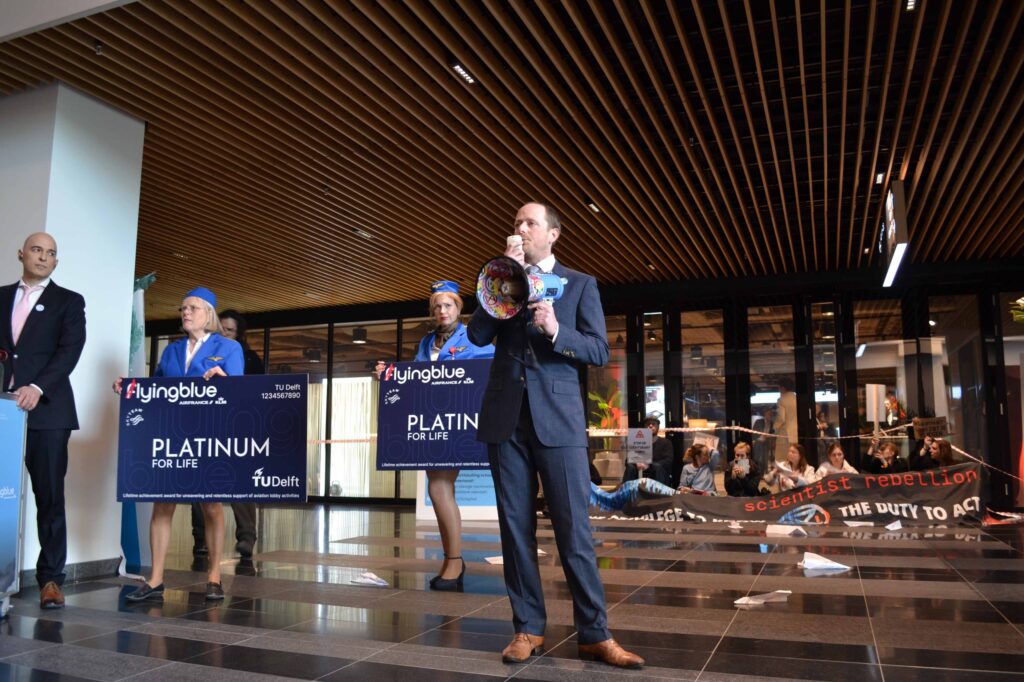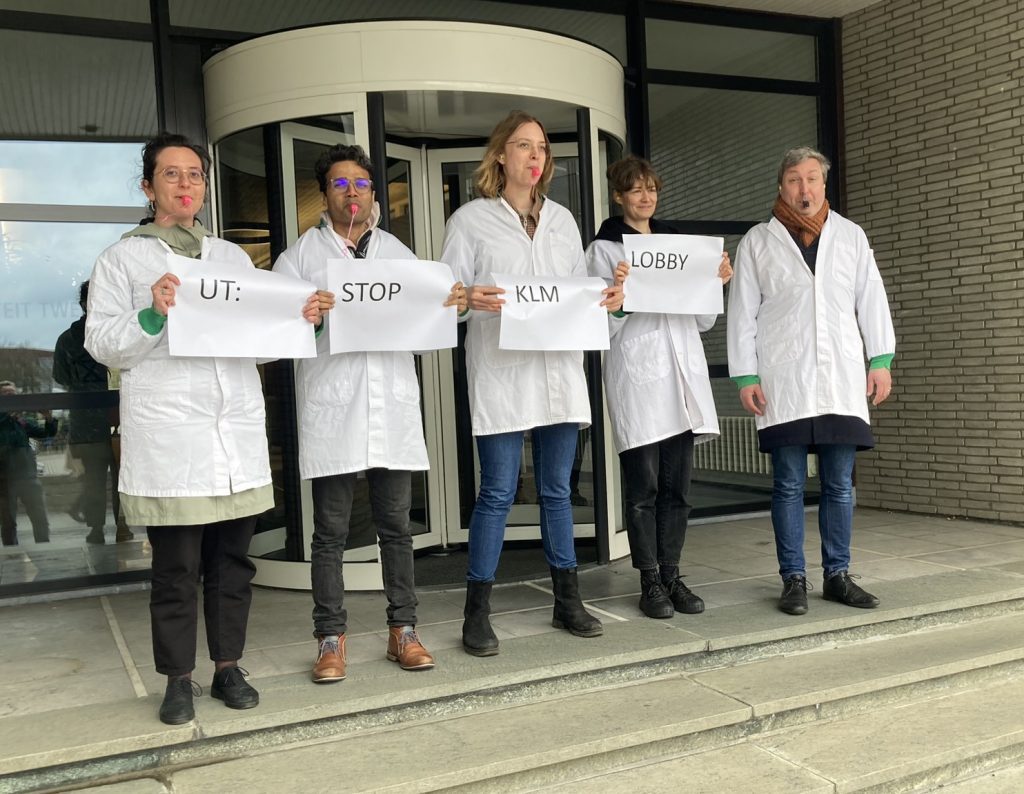TU Delft alumnus Boris Schellekens filed a complaint at TU Delft’s Research Integrity Committee against the Dean of his former faculty Aerospace Engineering (AE). He is hoping that TU Delft will withdraw from the Future-proof Aviation manifesto.
(Photo: Thijs van Reeuwijk)
Schellekens refers to article 1.1, clause 3 of the Netherlands Code of Conduct for Research Integrity. The clause states (freely translated): ‘In popular scientific statements, educational materials and advice of researchers, the principles and standards of this Code are applicable insofar that this can be reasonably expected.’ He believes that the Future-proof Aviation manifesto falls under ‘academics’ advice’ and signing it goes against the Code of Conduct’s three main principles: ‘honesty’, ‘transparency’ and ‘independence’.
Exerting influence
Schellekens started a petition in mid-March after he discovered that TU Delft’s logo appeared at the bottom of the Future-proof Aviation manifesto. The aviation lobby is planning to use this document to exert influence over a new Coalition Agreement. Dean Henri Werij of the Faculty of Aerospace Engineering was the person who signed the manifesto on behalf of TU Delft. He is not the only person from a university to have done so. The logos of TU Eindhoven and the University of Twente can also be found under the manifesto.
Parliamentary Committee and lobby event
The technical briefing on Verduurzaming Luchtvaart (making aviation more sustainable) (in Dutch) was held on 3 April in The Hague for members of the Ministry of Infrastructure and Water Management’s Parliamentary Committee. The associated fact sheet was partly written by Joris Melkert, Associate Professor at the Faculty of Aerospace Engineering.
The fact sheet summarises some main messages. It states that the growth of aviation worldwide does not match the Paris climate goals, will increase the noise level of aeroplane traffic, and the ultra-fine dust it creates will pose a potential health problem.
After the Parliamentary Committee’s session, the aviation industry hosted a closed lobby event on the same subject in The Hague. Only invited guests, such as members of the House of Representatives, were welcome and the press was not be permitted entry.

In an email, Werij says that he is not intending to respond to Schellekens’ latest action. They have previously had contact several times. In Delta, Werij explained that the manifesto is not an academic publication, but a plan with positive and negative aspects that he signed in order to exert influence. “Our Faculty wants to help make aviation better and more sustainable, but we will not achieve this alone. In his ministerial position, Marc Habers surprised me immensely. But I fear that a new Cabinet with parties that deny what is happening to the climate will view this differently. So it is good if we can exert some influence on a Government agreement.”
In light of an earlier interview with Werij in Delta, these were surprising statements. In 2022, he was ‘outraged’ about what he saw as the aviation lobby misleading people when it stated that electric powered flights were possible over large distances. Although he did then state that he sees it as his moral duty to work with the aviation industry ‘to share our knowledge with society and/or industry and in doing so to help make the world a better place’.
Severe accusation
The question is whether the Future-proof Aviation manifesto does this. It argues aganinst closing Schiphol Airport at night, while this is already on the agenda of The Hague’s politics. The manifesto also argues for policies that already exist, such as mixing 14% ‘sustainable aviation fuels’ by 2030. The lobby also wants to reduce CO2 emissions, but by a lower percentage than is needed to achieve the Paris climate goals.
If the Academic Integrity Committee (CWI) decides to handle Schellekens’ complaint, he has 10 weeks after filing it to hand in his advice to the Executive Board.
Schellekens says that he understands that his complaint entails a severe accusation. “I did not arrive at that decision lightly and want to emphasise that the complaint is not about the research that Henri Werij (and his colleagues) are doing in terms of making aviation more sustainable. This research is needed. The accusation is only about supporting some recommendations so easily that TU Delft helps create legitimacy.”
Dubious issues
Schellekens’ petition has been signed 500 times and is now on the desk of the Executive Board. The Executive Board announced through a spokesperson that it will not respond as Henri Werij has already done so. ‘That should be enough.’
Professor Andy van den Dobbelsteen, who is TU Delft’s Sustainability Coordinator, has reached a different conclusion, reports the Hoger Onderwijs Persbureau (higher education press agency). He looked into how TU Delft’s logo ended up on the manifesto. There is nothing wrong with striving for innovation for cleaner aviation, he says, but it also contains ‘more dubious issues which the Government is now being lobbied about.
Protest at University of Twente against ‘greenwashing KLM plans’

With referee whistles (and earplugs), five scientists from the University of Twente (UT) stood at the window of their Executive Board on 2 April. “Stop the KLM lobby,” was the message to their administrators. They too protested against their university’s support for the airline industry’s 10-point lobbying plan.
Guus Dix, one of the five campaigners, researches at UT how the fossil industry influences the public debate and campaigns for stricter climate policies with Scientist Rebellion. “By signing the manifesto, the technical universities are downplaying the scientific evidence about the necessary shrinkage of aviation,” he says. He wants the university to instead “speak out publicly against the KLM lobby”.
No verdict
On 2 April, the UT Board of Governors let it be known that it mainly supports point nine of the manifesto. That is about ‘innovative aviation’. The board says it has “no opinion” on the “details” of the other points in the manifesto. The university also says that the number of flight movements does need to be reduced, but it is not thinking of night closures, like Schiphol, but of reducing the demand for air travel.
Guus Dix calls this response politically naive: “It is not about endorsing only one of the ten points yourself. It’s about KLM using your academic reputation to delay or block rapid climate action.” (HOP/Olmo Linthorst)
Do you have a question or comment about this article?
s.m.bonger@tudelft.nl


Comments are closed.